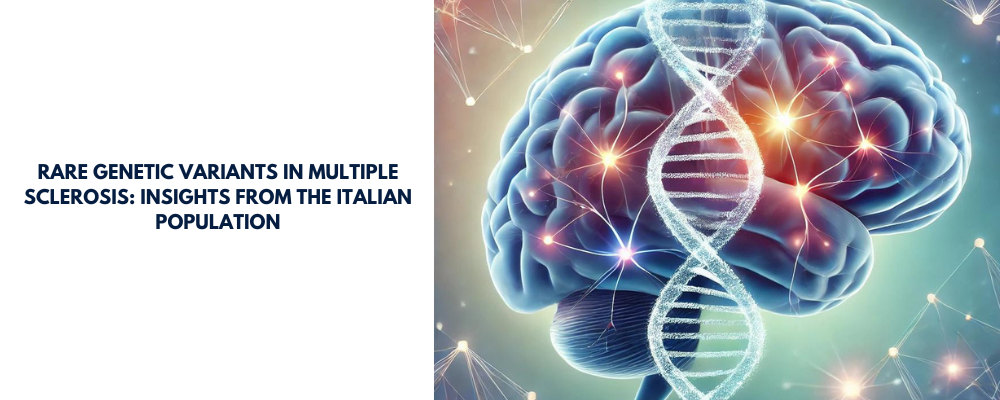Rare Genetic Variants in Multiple Sclerosis: Insights from the Italian Population

Multiple sclerosis (MS) is a complex neurological disease characterized by inflammation and demyelination within the central nervous system. While genome-wide association studies (GWAS) have identified more than 200 loci associated with MS, the heritability explained by these common variants accounts for only about 50% of the genetic risk. This gap has led researchers to explore the contribution of rare and low-frequency variants to MS susceptibility, which are not typically captured by traditional GWAS methods.
In a recent study by Clarelli et al. (2022), a team of researchers conducted an in-depth investigation of rare and low-frequency variants in MS patients of Italian continental ancestry. By leveraging next-generation sequencing (NGS) technologies, they sought to explore whether variants in genes already linked to MS by GWAS could further contribute to disease risk.
The Role of Rare Variants in MS
Clarelli and colleagues analyzed 98 genes previously associated with MS in 588 Italian MS patients and 408 healthy controls. The study focused on both protein-altering and regulatory variants with a minor allele frequency (MAF) of less than 5%. Their approach was to sequence these variants in both a discovery cohort and a replication cohort to validate their findings.
The researchers employed gene-wise tests to examine the cumulative effect of multiple variants within each gene. This method proved crucial for detecting associations with rare variants that might individually have weak effects but collectively could influence disease susceptibility. Through this innovative approach, the study identified 17 genes with a significant burden of variants.
Discovery of xEFCAB13: A Novel Gene in MS Susceptibility
Among the genes analyzed, EFCAB13 emerged as the most strongly associated with MS. This gene, which encodes an EF-hand calcium-binding protein of unknown function, harbored several rare disruptive variants (e.g., stop-gain, stop-loss, or splicing variants). The most notable finding was a stop-gain variant, which was more frequent in MS patients compared to healthy controls. Meta-analysis of three independent cohorts confirmed its significant association with MS.
Further investigation revealed that carriers of the stop-gain variant had reduced expression of the EFCAB13 gene. This suggests that the variant leads to transcript degradation through a mechanism known as nonsense-mediated decay, which could reduce the gene's protein output and potentially contribute to MS pathogenesis.
Understanding the Functional Impact of EFCAB13
Although EFCAB13 is poorly characterized, it is widely expressed across various tissues, including immune cells. The study's co-expression analysis indicated that EFCAB13 might play a role in immune system processes, particularly involving Th1 and Th17 cells, which are known to contribute to autoimmune diseases like MS. While the exact function of EFCAB13 remains unclear, the down-regulation observed in MS patients hints at a potential involvement in the disease's immune-related mechanisms.
Implications for MS Genetics
The findings of this study highlight the importance of rare genetic variants in understanding the full genetic landscape of MS. While common variants identified through GWAS have provided valuable insights, rare variants may explain additional heritability and uncover novel biological pathways involved in the disease.
The discovery of EFCAB13 as a novel susceptibility gene for MS underscores the need for further research into its function. As more large-scale sequencing studies are conducted, we can expect to uncover more rare variants that contribute to MS risk. Understanding the role of these variants will be crucial for developing more personalized approaches to MS diagnosis and treatment.
Conclusion
The study by Clarelli et al. offers new insights into the genetic architecture of MS, particularly the role of rare and low-frequency variants. The identification of EFCAB13 as a gene associated with MS susceptibility in the Italian population marks an important step in the quest to solve the mystery of MS heritability. As research continues, this work opens the door to novel therapeutic targets and a deeper understanding of the complex interplay between genetics and autoimmunity in MS.
Reference:
Clarelli, F., Barizzone, N., Mangano, E., Zuccalà, M., Basagni, C., Anand, S., Sorosina, M., Mascia, E., Santoro, S., PROGEMUS, PROGRESSO, Guerini, F. R., Virgilio, E., Gallo, A., Pizzino, A., Comi, C., Martinelli, V., Comi, G., De Bellis, G., Leone, M., … D'Alfonso, S. (2022). Contribution of Rare and Low-Frequency Variants to Multiple Sclerosis Susceptibility in the Italian Continental Population. Frontiers in genetics, 12, 800262.
